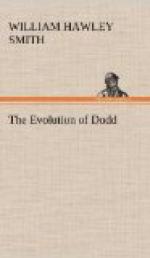At any rate, “Dodd” was a wayward boy from the first, a typical preacher’s son. He was rebellious, belligerent, and naturally deceitful. This last trait, matched with a vivid imagination, made him a great liar as soon as he grew old enough to use the two faculties at the same time. In this regard, however, he was not so wonderfully unlike a great many other people. He had bursts of great generosity; was brave and daring even to foolhardiness; had friends, and would stand by them till death, if need be, when the good impulse was on; or perhaps betray them in their greatest extremity if the opposite passion got control at a critical moment.
Intellectually he was bright, even to keenness; physically he was lazy and a shirk; morally his status is best represented by the algebraic sign 0-0; spiritually he was at times profoundly reverent and aspiring, or again, outrageously blasphemous, and reckless almost to desperation.
This is a partial catalogue of the characteristics with which “Dodd” was originally endowed. The character that was evolved from these, by means of the education that fell to the lot of this individual, is the business of these pages. To take such timber as is furnished in this specimen, and fashion from it a temple of the Lord, is a task that might puzzle angels. To make a decent child, a boy, or man out of “Dodd” Weaver, was the thing that worried everybody that had anything to do with him, and may, some day, perhaps, prove too hard a task for that individual himself. Yet his case is no uncommon one in many of its phases, for every day sees thousands quite like it in the school houses of America, as elsewhere.
And the question is, what are we to do about it?
Not to detail carefully all the events pertaining to the home life of “Dodd” up to the time he was six years old, it is enough to say that after the time he was able to creep, he lived much in the street. He was usually in mischief when not asleep, and his overworn mother and somewhat shiftless and careless father were so taken up with the other children and with family and pastoral cares, that “Dodd” grew up by himself, as so many children do; more is the pity.
A man seldom gets so many calves, or colts, or pigs that he cannot take good care of them, every one; but for his own children—well, it need not be said what, the cases are so frequent that everybody knows all about them.
“Dodd” was a youngster for everybody to tease. When he first began to toddle along the sidewalk in front of the house, the folks who came along would pull his little cap down over his eyes, and then laugh at him when he got mad and cried. All this tended to develop him, and doubtless the evolution of many points in his character took rise in these and similar events.
At last the morning dawned when “Dodd” was six years old, and there was joy in Parson Weavers household in the fact that now one youngster could be got rid of for six hours a day, and ten months in the year, Saturdays and Sundays excepted.




